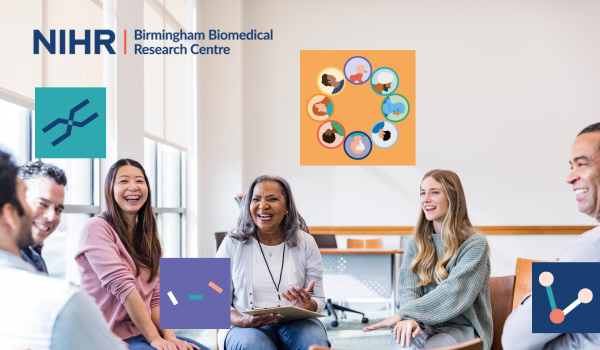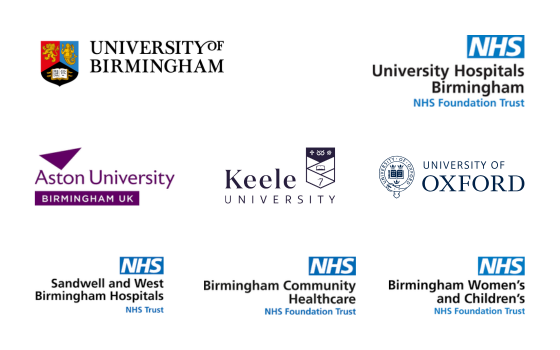
|
Patient and Public Involvement and Engagement Newsletter |
November 2024Hello,
Welcome to our first NIHR Birmingham Biomedical Research Centre (BRC) Patient and Public Involvement and Engagement (PPIE) newsletter. Each month, we will be sharing news, events, training and opportunities with you, our valued public contributors. |
What is the BRC?Some of you will be involved with research and PPIE groups in a range of research areas and may not realise that the work is related to the BRC.
The NIHR Birmingham Biomedical Research Centre (BRC) does research into the causes, effects, and treatment of inflammation to improve people’s health. We research into 11 different themes covering a range of conditions affected by inflammation including cancer, arthritis, liver disease, women’s health, and heart disease.
The BRC is funded by the National Institute for Health and Care Research (NIHR) and hosted by University Hospitals Birmingham NHS Foundation Trust in partnership with the University of Birmingham and our associate partners, Birmingham Community Healthcare NHS Foundation Trust, Birmingham Women’s and Children’s NHS Foundation Trust, Sandwell and West Birmingham NHS Trust, Aston University, Keele University and University of Oxford. |
Research involvement opportunities |
|
Did you know that we have a range of research involvement opportunities across the BRC? We're actively seeking new members for the PPIE groups below. Even if you’re already involved in one group, you’re welcome to join any other group you’re interested in and have lived experience of. To get involved, please get in touch at brcppie@contacts.bham.ac.uk and we will forward your email on to the relevant PPIE lead.
|
|
|
Gestational diabetes art & science workshopMonday 9 December | 1pm-4pm | Edgbaston Park Hotel, Birmingham What are we doing? We are looking for women with current or past lived experience of Gestational Diabetes to join an in-person workshop and take part in a creative art project to raise awareness about the condition. How can you help? By joining our workshop, you will share your perspective and ideas with other patients, doctors, scientists, artists and students. How will we support you? We will provide food and drinks, travel reimbursement up to £50 (all receipts must be kept), and a £50 gift voucher provided after the event. Register your interest via our online form by Monday 25 November. Please note spaces are limited and not guaranteed. |
|
|
GLO-Surgery clinical trialWhat are we doing? We are looking for adults with lived experience of cancer (particularly childhood cancer - either personally or a family member etc) to be involved in the clinical trial’s management committee, and occasionally to help with reviewing lay documents for the trial. The trial is exploring whether the use of a dye can help surgeons identify the tumour and lymph nodes during surgery in adults and children with tumours located in their chest, abdomen, lungs or kidney. How can you help? By joining our committee, you will share your experiences, perspective, and ideas with the trial team to ensure the research is designed and delivered in the most effective way, considering the patient’s needs. We expect the trial management committee will meet approximately every 3 months whilst patients are being recruited to the trial (which should take around 2 years in total). The meetings are expected to be mainly online, but if any are arranged in face to face, an online option can always be made available if needed. We may need lay documents reviewing as the trial progresses, but this will be only very occasionally. How will we support you? You would be invited to an initial introductory meeting to explain the trial to you, what will happen at the trial management meetings and how we hope you can help us at these meetings.
To express your interest, please contact the trial coordinators for GLO-Surgery by email in the first instance; Glosurgery@trials.bham.ac.uk |
Research news from the BRC |

New guidance to promote diversity and inclusion in clinical trialsMore patients from underserved communities could join and benefit from clinical trials, thanks to a set of new recommendations developed by an international research group led by our Birmingham BRC researcher Dr Lee Aiyegbusi. |

Most accurate test could detect 96% of women with ovarian cancerAn ultrasound test that detected 96% of ovarian cancers in postmenopausal women should replace current standard of care test in the UK, according to a new study involving Birmingham BRC researchers. |
|---|
First patient treated in cutting-edge rare liver disease clinical trialA clinical trial called FARGO is testing a new treatment to improve quality of life for patients living with primary sclerosing cholangitis (PSC), a rare liver disease. Hear from the first patient recruited, Rick Dallaway. |
|
|
New stromal cell treatment for chronic inflammatory diseases being trialledPeople with chronic inflammatory diseases are taking part in a new cell therapy clinical trial that one participant said made them feel “miles better”. Read about our trial, called POLARISE, and the experience of one of our patients, Rio 2016 Paralympic athlete Hannah Dines. |
|
|
Clinical trial shows rheumatoid arthritis drug could prevent diseaseA study involving our researchers found that a drug used to treat rheumatoid arthritis could also prevent the disease in individuals deemed to be at risk. Read about the findings and the perspective from patient Philip Day. |
Research engagement events from the BRC |

Public engagement Q&A on diabetesFriday 15 November | 12:00 PM | Online Join us during Diabetes Awareness Month this November for mini lunchtime talks and chat with scientists working on diabetes research at University of Birmingham. Topics will include Type 1, Type 2 and gestational diabetes. |

Diabetes family fun daySunday 17 November | 10am-12 noon | University of Birmingham A fun-packed morning of science, craft & games where kids can learn about diabetes & interact with our scientists! Suitable for families with children aged 4-10. |
|---|
Polycystic ovary syndrome (PCOS) research webinar seriesSat 30 Nov 10am-12pm, Mon 2 Dec 7-9pm and Tues 10 Dec 7- 9pm | Online We will be sharing findings from the DAISy-PCOS project, a research study which hopes to positively impact the treatment and management practice of PCOS, as well as improving quality of life for patients. Register here. |
|
|
Dry eye association dissemination and discussion daySaturday 11 January | 10am – 4pm | Vision Sciences building, Aston University Further information will be available on their website closer to the time where registration in advance will be required. |
|
|
Webinar on dental care, oral health & rheumatoid arthritisIf you have rheumatoid arthritis (RA) and think that oral health shouldn’t be top of your list – you may be surprised! Findings from recent studies suggest that there are significant links between oral health and those living with RA and other common co-morbidities such as heart disease and diabetes. View this recorded webinar with our Birmingham BRC Professor Iain Chapple to find out more. |
FeedbackDo you have any comments or suggestions about this newsletter? We'd love to hear from you.
Please email brcppie@contacts.bham.ac.uk to share your thoughts. |
ContactGot any queries or would like to enquire about joining one of our PPIE groups? Get in touch at brcppie@contacts.bham.ac.uk or call 07824841785. |

|
|
